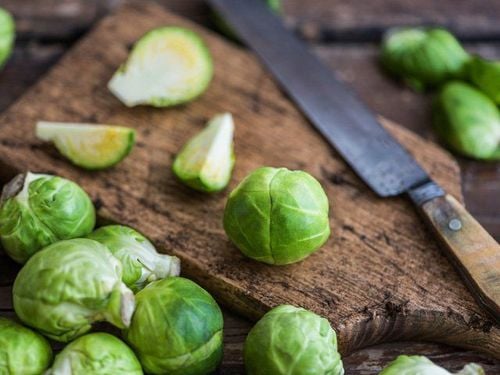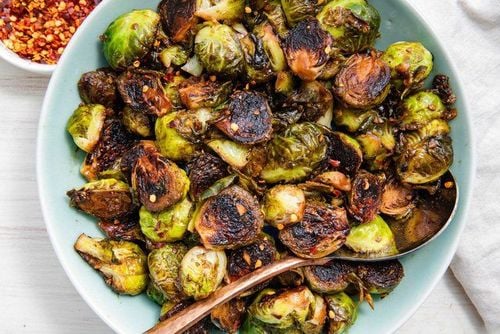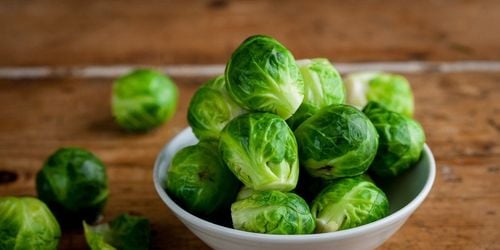This is an automatically translated article.
Brussels sprouts are a member of the Brassicaceae family and are closely related to kale, cauliflower, and broccoli. These cruciferous vegetables are like small cabbages and are often cut, cleaned, and cooked to make a nutritious side dish or main course. Brussels sprouts are high in many nutrients and have been linked to a number of health benefits.
1. What is Brussels sprouts?
Brussels sprouts are named after Brussels, Belgium, where it is believed they were first widely grown in the 16th century. Sometimes referred to as mini cabbages, they have appeared on lists of "disappeared vegetables" most hated" due to the potential bitterness caused by sulfur compounds. Overcooking vegetables, especially by boiling, will increase the bitter taste and unpleasant odor. However, when properly seasoned and seasoned, Brussels sprouts are naturally sweet and nutritious.
In the United States, most Brussels sprouts are grown in California, although they can be found at your local farmers markets. They are available year-round but peak growing season is in the fall to early spring.
2. Brussels sprouts and health benefits
Brussels sprouts are plants in the Brassica oleracea cruciferous family that includes broccoli, cauliflower, cabbage, kale and collard greens. Cruciferous vegetables contain a sulfur-containing phytochemical called glucosinolate, which gives it its distinctive odor and bitter taste. Food processing and digestion break down glucosinolates into compounds called isothiocyanates. These substances have been studied for their anti-cancer effects, protecting cells from DNA damage, and preventing new blood vessels from growing in tumor cells. However, there is no current researched evidence that Brussels sprouts have anti-cancer effects in humans. What's more, some evidence suggests they may increase the risk of pancreatic cancer. While we wait for more evidence, we should eat them no more than once per week, varying our diets with a wide selection of cruciferous vegetables such as broccoli, cabbage and cauliflower. .
Brussels sprouts contain a lot of:
Vitamin C Vitamin K Folate Carotenoid (beta-carotene, lutein, zeaxanthin) Fiber 2.1. Many nutrients
Brussels sprouts are low in calories but rich in fiber, vitamins and minerals.
Here are some key nutrients in half a cup (78 grams) of cooked Brussels sprouts:
Calories: 28 Protein: 2 grams Carbs: 6 grams Fiber: 2 grams Vitamin K: 137% RDI Vitamin C : 81% of the RDI Vitamin A : 12% of the RDI Folate: 12% of the RDI Manganese: 9% of the RDI The ingredients in Brussels sprouts are particularly rich in vitamin K. Vitamin K is necessary for the body's blood clotting process and bone strength. In addition, Brussels sprouts are particularly high in vitamin C, an antioxidant that promotes iron absorption and is involved in tissue repair and immune function. Furthermore, their high fiber content helps support gut health and regularity.
In addition to the above nutrients, equally important nutritional components in Brussels sprouts are vitamins B6, potassium, iron, thiamine, magnesium and phosphorus.

Thành phần trong cải Brussels đặc biệt giàu vitamin K
2.2. Rich in antioxidants
Brussels sprouts offer many health benefits, their high antioxidant content is one of their dominant and outstanding characteristics. Antioxidants are compounds that reduce oxidative stress in your cells and help reduce your risk of chronic disease.
In one study, when participants consumed about 300 grams of Brussels sprouts per day, the results showed that damage at the cellular level caused by oxidative stress was reduced by 28%. The prominent antioxidant component in Brussels sprouts is kaempferol, an antioxidant that has been extensively studied for its many health-promoting properties.
2.3. May help protect against cancer
Studies show that the high concentration of antioxidants in Brussels sprouts helps the body protect against certain types of cancer. There are several possible ways this could work.
A 2008 study found that Brussels sprouts may protect against carcinogens, or carcinogens, and prevent oxidative damage to cells.
In another study, using Brussels sprouts increased levels of certain detoxifying enzymes by 15–30%. These effects may lead to a reduced risk of colorectal cancer, although more research is still needed.
In addition, free radicals are neutralized by the antioxidants in Brussels sprouts. These are compounds formed by oxidative stress that contribute to diseases such as cancer.
Brussels sprouts as an integral part of a balanced diet and healthy lifestyle, beneficial nutritional factors may help reduce cancer risk, however more research is needed.
4. High in fiber Just one-half cup (78 grams) of cooked Brussels sprouts contains 2 grams of fiber, meeting up to 8% of your daily fiber needs. Fiber is very important for health, including a large amount of fiber in the daily diet will bring many health benefits.
Studies show that dietary fiber can relieve constipation by increasing stool frequency and softening stools for easier bowel movements.
The beneficial bacteria in the gut are nourished by the fiber content in Brussels sprouts that promotes digestive health.
Eating more fiber has also been linked to other health benefits, like helping to lower the risk of cardiovascular disease and stabilizing blood sugar.
Current guidelines recommend that women eat at least 25 grams of fiber per day, and for men at least 38 grams of fiber per day.
Eating Brussels sprouts, along with other good sources of fiber like fruits, vegetables and whole grains, can easily help you meet your fiber needs.
2.5. Rich in vitamin K
Brussels sprouts provide a large amount of vitamin K for the body. In fact, just a half cup (78 grams) of cooked Brussels sprouts provides 137% of your daily vitamin K needs. This important nutrient plays an important role in the body.
It is essential for blood clotting, the formation of blood clots that help stop bleeding. Vitamin K may also play a role in bone growth and may help protect against osteoporosis, a condition characterized by progressive bone loss. In fact, an analysis of seven studies concluded that vitamin K supplementation can increase bone strength and reduce fracture risk in postmenopausal women.
Remember that people taking anticoagulants should moderate their vitamin K intake. But for most people, boosting their vitamin K intake can have many health benefits.

Bắp cải Brussels như là một thành phần không thể thiếu chế độ ăn uống cân bằng và lối sống lành mạnh
2.6. May Help Maintain Healthy Blood Sugar
In addition to being packed with nutrients and other health benefits, Brussels sprouts can also maintain stable blood sugar levels. Many studies have shown that increasing consumption of cruciferous vegetables, including Brussels sprouts, can reduce the risk of diabetes. Brussels sprouts are high in fiber, which helps regulate blood sugar levels.
Fiber moves slowly through the body without being digested and slows down the absorption of sugar into the bloodstream. Brussels sprouts also contain alpha-lipoic acid, an antioxidant that has been studied extensively for its potential effects on blood sugar and insulin levels.
Insulin is a hormone responsible for moving glucose from your peripheral blood into your cells, helping to keep your blood sugar under control.
In one study, 12 diabetic patients supplemented with alpha-lipoic acid had increased insulin sensitivity. This may be because alpha-lipoic acid helps increase insulin action more effectively to lower blood sugar. Eating plenty of Brussels sprouts in combination with another healthy diet can help you keep your blood sugar steady.
3. How to prepare Brussels sprouts
Buy Brussels sprouts that are bright green with tightly packed leaves. Yellow or wilted leaves are a sign of aging and deterioration. They can last for 3 to 5 weeks at 0°C frozen, and about 1 to 2 weeks in the refrigerator. Longer storage can cause discoloration, black spots on leaves, wilting and rotting. Older Brussels sprouts also tend to produce a stronger odor.
Rinse Brussels sprouts under cool running water to remove debris. Trim off the hard stems below, remove dead leaves and lose their outer color.
3.1. Roast
Cut the Brussels sprouts in half and layer the cut sides on a baking tray lined with greaseproof paper or in a baking dish. Saute with olive oil and a pinch of salt. Bake in a preheated oven at 400 F until golden on the outside and tender on the inside. Smaller Brussels sprouts (about 2.5 cm in diameter) should be roasted in 18 minutes, while those 3-4 cm in diameter or larger can take 20-25 minutes.

Cắt đôi bắp cải Brussels và xếp các mặt đã cắt thành một lớp trên khay nướng có lót giấy chống thấm hoặc trong đĩa nướng
3.2. Steam
Fill the bottom of the pot with water to about 5cm. Cover and bring to a boil, then place the cleaned and trimmed Brussels sprouts in the steaming basket and insert into the pot. Reduce heat to medium, cover pot and cook for 6-8 minutes until tender. Then, open the handle to let the steam out for a few minutes to release the strong sulfur compounds.
3.3. Shredded
Cut the Brussels sprouts in half lengthwise. Then, cut into thin slices and use your fingers to separate the leaves into small strands. They can be used in a salad or a quick stir-fry with a dash of olive oil.
Some grocery stores sell Brussels sprouts with their stems included. Not only do they look good, but they also help prolong freshness because the stems nourish the sprouts after harvest and help retain moisture longer than loose sprouts.
Please dial HOTLINE for more information or register for an appointment HERE. Download MyVinmec app to make appointments faster and to manage your bookings easily.
Reference source: hsph.harvard.edu












